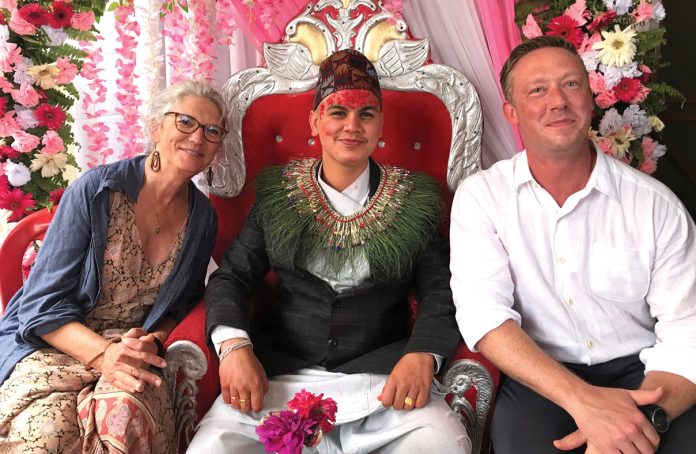

Story and photo Van Mitchell, Staff Writer
Pam Melson, RN, MSN, BC-NC, Clinical Assistant Professor, with the Kramer School of Nursing at Oklahoma City, visited Nepal this summer.
She has students in her class from Nepal, Manisha Raut and Punam Baral, that connected her with family members while she and her son, Nathan Hursh, were visiting abroad.
“They (students) wanted me to meet their families,” Melson said. “With two different families, they showed us all over Kathmandu, they showed us places we would have never gone to had we not gone there with them. It was really life-changing. Seeing the kindness of people and how they function together in a community, I loved everything about it.”
Melson said her experience in Nepal reaffirmed the importance of OCU’s international student pipeline. (story continues below)
“It was wonderful being in another country,” she said. “It made me realize how important it is for us to have international students at OCU, and understand the way that other people live.”
Melson has been with Kramer since the Fall of 2012. Prior to her teaching at Oklahoma City University, her primary nursing roles were in diabetes education/wellness and prevention, psychiatric, and hospice nursing. While her primary current role is the RN-BSN program teaching Community, Servant leadership and Holistic nursing courses.
Melson assists with the traditional courses of Mental and Family Health clinicals. Her greatest teaching passion is traveling with students to Belize, Mexico and NE Oklahoma to explore diversity and commonalities of traditional and alternative health care practices in the community.
She has also led community health nursing excursions to Mexico, and helps organize an annual event called the Caring Across Cultures Conference. She serves on the Continuing Education Committee who organizes this event.
Designed specifically for OCU nursing students, the Community Health Nursing program in Oaxaca, Mexico, allows students to gain international clinical experience while also learning about historic and indigenous sites in central Mexico. The program has been paused due to the COVID-19 pandemic, but is planning to resume next summer
The program, led by Professors Melson and Beth Pitman, satisfies the required clinical and service hours for OCU’s Community Health Nursing course or a Servant Leadership course. The course includes a homestay, some traditional meals, lectures and activities about community health practices and traditions. It also includes what is mentioned below as well as private and public hospitals and service-learning opportunity is a hostel for families whose loved ones are in the public hospital-many people must travel far for health care.
When the program resumes, students will learn about traditional medicine in Oaxaca’s botanical gardens, visit the indigenous Zapotec village to learn about local traditions and healthcare practices, and see the Monte Alban archaeological site.
“They get to see how education works, and how healthcare works, but they also get to learn about the culture and the food,” Melson said. “It is them being fully immersed into another culture. We all have strengths and weaknesses. I love seeing students discover that on their own, and teach me things. They come home with new eyes. We always need to learn from one another.”
Melson said she respects the nursing students who step out of their comfort zone to study abroad, and immerse themselves with fellow students at OCU, forming life-long bonds.
“I think it is pretty brave, because I never did that as a student,” she said. “The first thing I learned is that they are brave enough to come from another country. I get to see how people adapt well. It adds a richness, because I also get to see their communion and their relationships with other students, and what they teach them.”
Melson said students from different cultures can learn from each other, and in turn become better at their professional craft.
“If we always believe that our way is one way, and our truth is the truth, then I think we miss out,” she said. “I think you see them work together in the classroom; it begins to weave this tapestry of what communion really means. I want them to be their greatest selves. I hope they learn to listen and know what their patient’s cultures are. Just asking a few questions and listening, I think that is when healing begins to take place.”
Melson said she hopes her passion for traveling abroad and learning has helped make her a better professor, a better friend, and a better person.
“I tell students that I am an open-door teacher,” she said. “I want to always learn from my students, and I want them to know that I am a safe person to learn from. I want to help them to think about things in a different way, and I want to see their way, whether I agree with it or not. I love teaching, and I am grateful for every day.”












